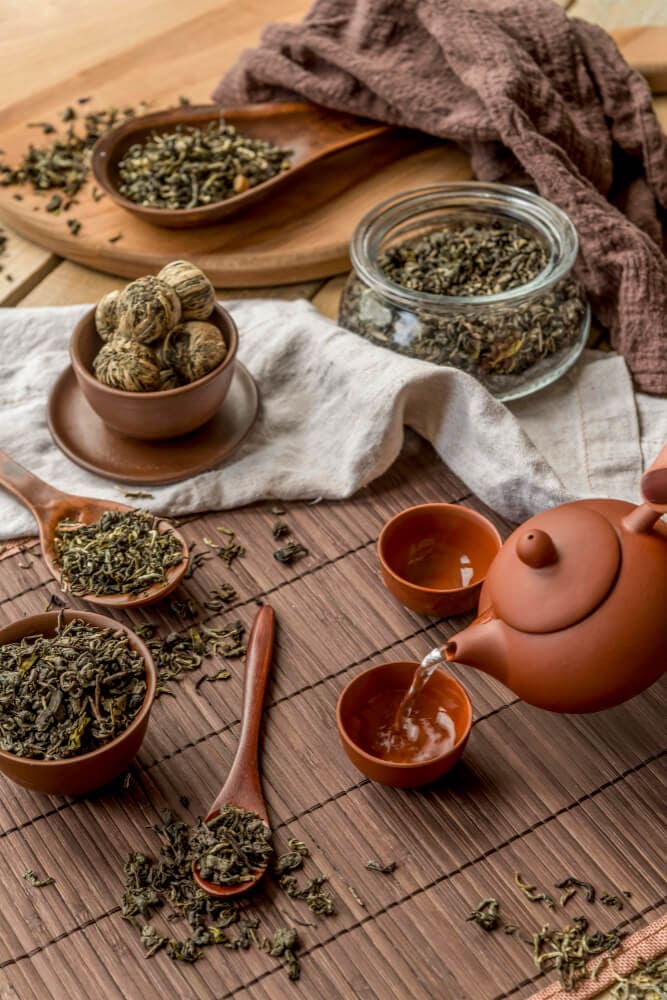Table of Contents
In today’s world, anxiety is something one hears about or experiences daily. Man is always looking for a way out of the stress brought about by multitasking. Among many other herbal and botanical solutions, herbal teas are the gentle yet effective answer. These traditional botanical brews not only soothe the soul, but they also offer a natural manner of tranquilizing the mind and body. From ancient rituals to contemporary routines for wellness, herbal teas have secured their place as gentle yet potent companions in pursuit of peace of mind.
Understanding Anxiety and Its Impact on Daily Life
Anxiety is not a passing feeling of nervousness; it could be one chronic condition that can affect the general well-being of a person. Persistent anxiety intrudes into daily routines and makes even simple tasks overwhelming. It interferes with sleep patterns, impairs focus, and can strain personal or professional relationships. If not checked, anxiety can rise to critical conditions such as panic disorders or even depression. Understanding the root cause and influence of anxiety on an individual’s mental and physical well-being is essential for learning how to manage the disorder effectively.
- Why Herbal Teas for Anxiety Alleviation?
Perhaps people look towards herbal teas for anxiety relief because they are a natural and passive method of taking care of such health disorders. Unlike prescribed medications that may have side effects or cause dependency, herbal teas are gentler plant-based alternatives. Herbal teas have been used for millennia in many cultures to soothe the nerves and calm the spirit. Their natural properties interact positively with the body’s systems, cultivating a sense of balance without causing overstimulation. For individuals who seek a more holistic approach to managing anxiety, herbal teas address the concern as much as the ritual of self-care itself.
- The Science Behind Herbal Teas and Relaxation
While that may sound simple and pleasurable, there is some real science behind the way sipping a warm cup of tea relaxes us. Herbal teas contain bioactive compounds that interact with the nervous system to reduce anxiety and promote relaxation. Many teas have mild sedative properties that help regulate production of the stress hormone cortisol. Other herbs, such as chamomile and valerian root, enhance the production of gamma-aminobutyric acid, which is a neurotransmitter that reduces activity in the brain. This provides some scientific credibility to a long-standing tradition of using herbal teas to regulate anxiety.

How Herbal Teas Help Calm Anxiety
Herbal teas help reduce anxiety on numerous levels. The warmth of the tea relaxes tense muscles physically, while sipping drives one to breathe more slowly, thus creating mindfulness. On a chemical level, the herbs involved in preparations of these teas have chemicals within them that are responsible for calming the nervous system. A prime example of this is that when lavender tea is consumed, it triggers the secretion of serotonin and dopamine, neurotransmitters that modulate mood and help against stress. In addition, the preparation and drinking of tea acts as a time-out from the stressor-the break so desperately needed during a stressful day.
- Natural Stress-Reducing Herbal Compounds in Teas
Most herbal teas have bioactive natural substances that have been researched to have reducing effects on stress. Some of the phytochemicals contained in herbs like chamomile, lemon balm, and green tea include flavonoids, polyphenols, and antioxidants. These chemicals act by reducing the oxidative stress in the body, which is usually at an elevated level when anxiety occurs. In this light, these teas will not only have a calming effect on the mind but also help in maintaining physiological health through anti-inflammatory and circulatory effects. It acts in synergy to help the body regain its normal balance and, as such, is a holistic approach to anxiety.
- Antioxidants and Flavonoids Play a Role in Relaxation
Most herbal teas contain a high amount of flavonoids and antioxidants, which are perceived to be important for relaxation. Antioxidants drive out the negative impact of free radicals, which are associated with stress and anxiety. Flavonoids, as a category of antioxidants, directly work through the pathways of neurotransmitters that help relax the brain. For instance, green tea has all those unique concentrations of L-theanine, which can trigger a relaxed state while not causing drowsiness. These chemicals achieve anti-inflammatory activity and promote neural well-being, thereby putting individuals under mental calmness and clarity.
- Herbal Teas Versus Conventional Anxiety Drugs
Compared with traditional anxiety drugs, herbal teas are non-heavy and might be free of side effects such as dizzy spells, fatigue, or dependencies. Although medications can quickly relieve the symptoms, they do not generally remove the root cause of anxiety issues as profoundly and holistically as herbal teas do. Herbal teas take longer action and improve long-term well-being by aiding in the body’s processes. They do not come with the problems of developing tolerance or withdrawal; hence, they are generally more widely used for treatment when one wants to provide themselves with a natural, long-term approach towards their management of anxiety.
Top Herbal Teas for Anxiety Relief

- Chamomile: The Classic Soothing Tea
Chamomile is probably among the best-known herbal teas for relaxation. It exerts mild sedation on both the mind and the body, thus being the ideal means for relaxation in the evening. Chamomile contains apigenin, an antioxidant which attaches to brain receptors, thus creating a sleep effect.
- Peppermint: Cooling Relief for Anxiety
Peppermint tea is refreshing for anxiety relief; menthol in this tea works as a muscle relaxant that contributes to releasing physical tension often accompanying stress.
- Lavender: A Fragrant Calm in a Cup
Lavender tea is appreciated for its fragrant aroma, which already can reduce the level of anxiety. The tea itself increases serotonin levels, providing additional benefits for enhancing mood.
- Lemon Balm:
Uplift Your Mood and Relax Lemon balm is from the mint family; it uplifts your mood and keeps you relaxed. Scientifically, lemon balm has been proven to decrease anxiety disorders by increasing the quantity of GABA in the human brain.
- Passionflower: Unknowing Anxiety Fighter
But the less recognized Passionflower brings great efficiency in the treatment of anxiety. It increases GABA levels in the brain in much the same way traditional anti-anxiety medications do, but it’s not habit-forming.
- Valerian Root: Deep Relaxation and Better Sleep
Valerian root is very well known for its natural sedation effects and hence highly favorable for those in whom anxiety disturbs sleep. Not only does it help in reducing anxiety, but it also facilitates deep, sound sleep.
- Ashwagandha: Adaptogen to Manage Stress
Ashwagandha is an adaptogen that works in the body to adapt to stress while keeping cortisol in balance. This great herbal remedy can be taken as a tea that could give general relief in chronic anxiety and chronic stress.
- Holy Basil: The Sacred Herb for Inner Peace
Holy basil is, and was considered in Ayurveda to be sacred, since it calms the nervous system and thus creates clarity of mind while diminishing stress. Tulsi tea supports the body’s response to physical and emotional stress, promoting a feeling of well-being and balance.
- Green Tea: The Balanced Calm from L-Theanine
While green tea does contain caffeine, it also has a huge amount of L-theanine, which is a relaxing amino acid that does not depress the individual into a sleepy state. Thus, for those who must stay awake but control their stress, green tea might just do very well.
- Rose Tea: The Flowery Means to Emotional Well-being
Rose tea, which is prepared from the rose petals, is an aromatic and gentle way of soothing one’s soul. In this respect, it helps to purify the individual from anxiety, more so when there is emotionally bound or tied anxiety to a feeling of sadness.
How to Prepare Herbal Teas for Maximum Benefits
For maximum benefits from your herbal tea, preparation must be done correctly. Start first with fresh, filtered water and generally avoid boiling water, as herbs such as chamomile and lavender can lose some potency and flavor when overheated. Another thing to take into consideration is steeping time; while stronger herbs like valerian root may need to steep for longer, more delicate teas need a shorter amount of time so they will not become oversteeped and lose flavor and efficacy.
- Best Practices in Brewing Herbal Teas
It is always a good idea to cover your tea while steeping to retain volatile oils that might escape and act to make your treatment effective. Whenever possible, you want to use whole herbs instead of pre-packaged tea bags for maximum potency. Fresh herbs are far more flavorful and full of nutrients, but dried herbs are so much easier to work with and just as effective if you get them from good suppliers.
- How Long Should Your Herbs Steep? Fresh or Dried?
Each has its pros: fresh herbs are more flavorful and contain higher levels of some nutrients, while dried herbs are more concentrated and have longer shelf lives. Use according to preference, but make sure the herbs used are organic and pesticide-free to avoid poisoning your system with toxins.
- Organic and Non-GMO Ingredients are Paramount
Using organic, non-GMO herbs ensures that your tea is devoid of harmful chemicals that would detract from the calming effects one hopes to achieve. Organic farming practices preserve the plants’ natural potency, providing a more pure and effective product.
When to Drink Herbal Teas for Anxiety
Certain times of the day are better suited for certain herbal teas. For example, morning teas-like peppermint or green tea-set a calm and focused tone that would carry throughout one’s day. Teas in the afternoon-like lemon balm or rose-can alleviate midday tension, while teas like chamomile or valerian root are best saved for evening to help ensure a relaxing and restful sleep.
- Morning Teas to Center Your Day Gracefully
Start your day with a cup of peppermint or green tea that evens out energy with relaxation. These teas will give you a soft, centered start of the day without jittery, let’s-get-moving effects of coffee.
- Afternoon Brews for Midday Stress
In the afternoons, when stress is mounting, lemon balm and tulsi are going to be your saviors as teas. These teas are clear and calm, easing tension without sending you into doze mode, and therefore are great for a mid-afternoon pick-me-up.
- End-Teas for Sleepiness and Relaxation
To aid one in falling into a better sleep, when the sun goes down, a more potent sedation tea such as chamomile, valerian root, or passionflower can be consumed to initiate the body to go to sleep. These teas will calm your mind and relax your body, so you can have a quiet, restful night’s sleep.
Mixing Herbal Teas for Easier Anxiety
By blending herbs together, one can create a more personalized and effective tea that works to alleviate anxiety. Blending chamomile with peppermint, for example, will add both the cognitive element of relaxation and the supporting element related to digestion. In contrast, a mixture of ashwagandha and holy basil may achieve much deeper levels of stress relief and bring in an element of inner peace.
- The Benefits of Blending Different Herbal Teas
Herbal tea combinations allow for the effect of synergy, wherein the combined properties of different herbs enhance one another. Such customization can target specific anxiety symptoms, from racing thoughts to physical tension, offering a more comprehensive approach to stress management.
- Customizing Your Tea Blends for Specific Levels of Stress
You can blend your herbal teas depending on the level of your stress. If you feel slightly stressed, then a light tea will do, such as lemon balm or lavender; if the stress is stronger, then something like valerian root and passionflower is called for.
Possible Side Effects and Precautions
While herbal teas are fairly innocuous, not everyone reacts positively to them. Be aware of any history of allergies or sensitivities to any particular herb. In some cases, valerian root or ashwagandha, for example, should be used with extreme care in people who have specific health conditions or in conjunction with some medications.
- Who Should Avoid Certain Herbal Teas?
Certain herbal teas-valerian root and passionflower among them-are contraindicated for pregnant or breastfeeding women and those with heart conditions and should be checked with a physician before consuming, as they may interact with medications. That said, these herbs are potent-and sometimes interact in ways that could be undesirable with certain medications and/or conditions.
- Safe Dosages of Anxiety-Relief Teas
Moderation is key with herbal teas. Valerian root and ashwagandha are two herbs that, if taken in excess, might make one feel drowsy or even worse due to various side effects. Always start low and go up to what’s needed with any new herb, especially when introducing this into one’s routine.
- Medication and Health Condition Interactions
Certain herbal teas have interactions with some medications, which can amplify or decrease its main effects. It is best to avoid using the combination of valerian root with other sedatives because it may act on the body to increase drowsiness. Always check prescription medication with a healthcare provider before adding herbal tea to your regimen.
Incorporating Herbal Teas into a Comprehensive Anxiety Management Protocol
Herbal teas may be part of the greater, holistic strategy that may prevent anxiety. Paired with mindfulness practice, therapy, or other stress-reduction methods, they offer a whole program toward emotional wellness.
- Herbal Teas to Go Along with Mindfulness and Meditation
Herbal teas are a great ally to mindfulness and meditation. Drinking tea mindfully can augment those practices by helping calm the mind and bring a feeling of peace.
- Herbal Teas That Support Therapy and Counseling Time Periods
Herbal teas can be helpful for therapy or counseling time periods, mainly regarding the management of anxiety. They come out as an additional form of keeping one in a state of balance and preventing outbursts of anxiety during recovery.
- Creating a Relaxation Routine with Herbal Teas
Preparing herbal teas can be considered a ritual of relaxation. Thus, whether in the morning, afternoon, or evening, it not only provides sufficient time to prepare the tea but also time to enjoy and consume the herbs for promoting mindful care of oneself-a concrete way of helping one sustain relief from anxiety in the long run.
Conclusion
Herbal teas are natural and helpful in managing anxiety, minus any of the adverse effects usually associated with conventional medication. Using the right blend of herbs and incorporating them into a daily routine, one can enjoy both immediate and long-term benefits. Whether you want to settle your mind, relax your body, or uplift your spirit, there’s always an herbal tea around that will guide you toward a more peaceful, balanced life.








4 thoughts on “Herbal Teas for Anxiety: Calm Your Mind Naturally”